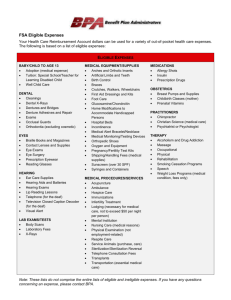


Retired individuals and those who are unemployed also don’t qualify for a LPFSA. However, they can open a health savings account (HSA) if they have a qualified HDHP and want to gain tax benefits for health expenses. Self-employed individuals do not qualify for an LPFSA or a traditional health flexible savings account (FSA). An LPFSA covers the employee, their spouse, and any eligible dependents. This account is only available if an employer offers it. Who qualifies for a LPFSA?Įmployees with a qualified high-deductible healthcare plan (HDHP) and health savings account (HSA) may choose to have a limited-purpose FSA. In some cases, you can use your LPFSA to pay for out-of-pocket expenses related to other qualified medical expenses after you reach your insurance deductible.īelow, we will discuss how a LPFSA works and what expenses qualify. Unlike a regular health FSA, this employer-sponsored account is primarily used to pay for qualified dental and vision expenses. These accounts are typically combined with a health savings account (HSA) to help families increase their healthcare savings during the year. Late fees (e.g.A limited-purpose flexible spending account (LPFSA) is a pretax account only available to employees enrolled in a qualified high-deductible healthcare plan (HDHP). Qualified premiums include: COBRA health insurance, insurance premiums after you reach age 65 (including Medicare Parts A, B, C and D but not Medicare supplement plans), qualified long-term care insurance, health insurance premiums while receiving unemployment compensation under state or federal law and premiums for employer-sponsored retiree medical plans for account holders 65 and older.

Household products/improvements to treat allergiesĬounseling must be performed to alleviate or prevent a physical or mental defect or illnessĬertain health insurance premiums are eligible to be paid out of an HSA. Home improvements (e.g., exit ramps, widening doorways) Guide dog/service animal (purchase, care for, training) is eligible for reimbursement.īreast reduction surgery that is medically necessaryĬhildbirth/lamaze classes (related to birth)Ĭhiropractic treatments (e.g., adjustments)Ĭoinsurance amounts (health, dental or vision)Ĭomtrex, DayQuil, NyQuil, Motrin, Theraflu, Vicks, SudafedĬonvalescent home (for medical treatment only)įor repair or reconstruction after accident or surgery or for correction of birth defectĬosmetics, hygiene products and similar itemsĭental procedures, non-cosmetic (e.g., X-rays, fillings, extractions, crowns, implants)ĭiabetic supplies (e.g., insulin, syringe, monitor, insulin pump)ĭigestive relief (e.g.Tums, Pepto-Bismol)Įyeglasses – prescription sunglasses/safety glassesįeminine hygiene products (e.g., tampons)įertility treatments (e.g., artificial insemination, egg donor fees, in vitro)įluoridation treatment at a dental office The difference between the cost of a regular book, audio, etc. Ibuprofen, Advil, Motrin, Midol, Naproxen, Aleve, NaprosynĪsthma treatments (e.g., inhaler, nebulizer) Maalox, Tums, Pepto-Bismol, Pepto Bismol, Alka-seltzer, Prilosec, Pepcid, Omeprazole, Zantac, NexiumĪllegra, Benadryl, NSAIDs, Claritin, Zyrtec, Xyzal, Antihistamines, Alavert, Brompheniramine, Clarinex, Astelin, Optivar, Elestat, Patanol, Flonaseīiofreeze, Vicks vaporub, Bengay, Capzasin, Icyhot, Solarcaine, chest rub Itemized statement from 23andMe must be provided or you can access the FSA calculator to determine the eligible portion of the test: Calculatorīinder, girdle, posture, lumbo-sacral, lumbar


 0 kommentar(er)
0 kommentar(er)
